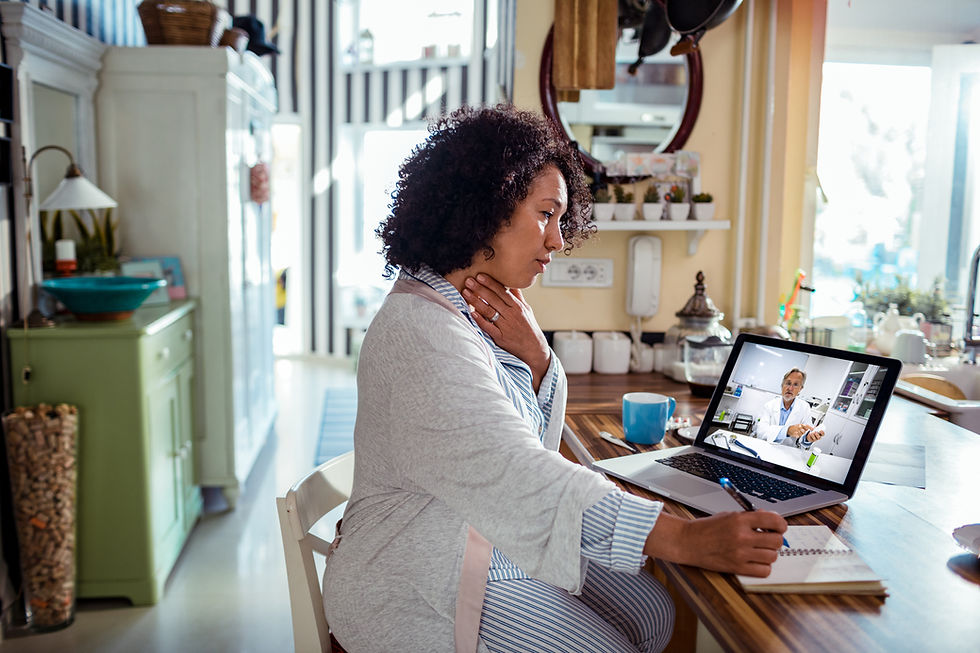Bridging the Gap: Integrative medicine for cancer recovery - by Dr. Chasse Bailey Dorton, MD
- Dr Chasse Bailey-Dorton, MD

- Nov 5, 2023
- 3 min read
Updated: Sep 12, 2025

The power of integrative medicine in cancer survivorship
October is Breast Cancer Awareness Month – and I am very aware!
I “celebrated” my first October breast awareness month in 2002 by starting my first day of chemotherapy treatment for breast cancer having just been diagnosed at age 39. I worked as a full spectrum family physician (including obstetrics and hospital work), with 3 kids (ages 2, 4, and 7) and my husband working full-time as a small-town physician.
Since then, “Bald to Buff” has become my life motto after finishing treatment including undergoing surgery, chemotherapy, radiation, and hormonal therapy which left me too weak at times to climb a flight of stairs. I wanted to move to the completely other end of the physical spectrum. Since finishing treatment, I have completed a marathon, ironman triathlon, climbed Kilimanjaro, ridden a bike from SC to Texas, completed an Integrative Medicine fellowship, traveled to Africa three times for mission work, left a family medicine practice to start at Integrative Oncology/Survivorship program at a major cancer center and most recently become completely enamored with pickleball.
So, what have I learned that can help someone, recently diagnosed, currently having treatment, or a long-term survivor of cancer?
Navigating the complexities of post-cancer recovery
A common feeling is “loss of control.” When you first hear the word “cancer” it is like being thrown into a hurricane. Things happen fast and it is scary. Most times in life when you feel bad or fall ill you see a physician who helps you feel better. But often with breast cancer you feel fine but face treatment that can have multiple side-effects. And as scary as diagnosis and treatment can be, the end of treatment can be even scarier. How do I recover? Will it come back, and will I know if it comes back? What can I do to decrease to risk of it coming back? And how do I deal with lingering side effects?
When I see a survivor for their first consultation, I begin by seeking to understand the patient’s perspective. Common starting questions include, “tell me your story”, I’ve read the chart but want to hear the patient’s perspective and their understanding. Next, I ask about nutrition, physical activity, sleep, supplement use, stressors, sexuality, and their support system. Often this is the first time a patient has been asked about some of these aspects of their well-being.
Empowering yourself: strategies for long-term wellness
People with cancer are bombarded with false information on the internet, someone always trying to sell them something, and friends/family telling them what they should or shouldn’t do to treat their cancer. They need credible sources of information and empowered to become an integral part of their care and recovery.
Providing evidence-informed advice on nutrition, physical activity, supplement use, environmental exposures, non-pharmacological sleep strategies, stress management skills, and management of long-term side effects of cancer and cancer treatment is a big part of my role in Integrative Oncology. And risk reduction strategies to decrease the risk of a recurrence.
So, if you or someone you know has been recently diagnosed with cancer or is a cancer survivor, seek someone fellowship-trained in Integrative Medicine to help them develop an evidence-based plan to get through treatment, recover from treatment, and decrease the risk of a recurrence. We can become stronger after a cancer diagnosis; I know I have.
The After Cancer is just the place to help cancer survivors and their loved ones find the answers and help that they need. And it doesn’t matter where you live or where you received treatment since it is a virtual practice that comes to you!
About Dr. Chasse Bailey-Dorton
Dr. Chasse Bailey-Dorton, MD is a 21-year breast cancer survivor and the Medical Director of The After Cancer. Her mission is to provide reliable information for someone with a cancer diagnosis, being treated for cancer, recovering from treatment, seeking cancer recurrence risk reduction strategies, or at high risk for cancer.





